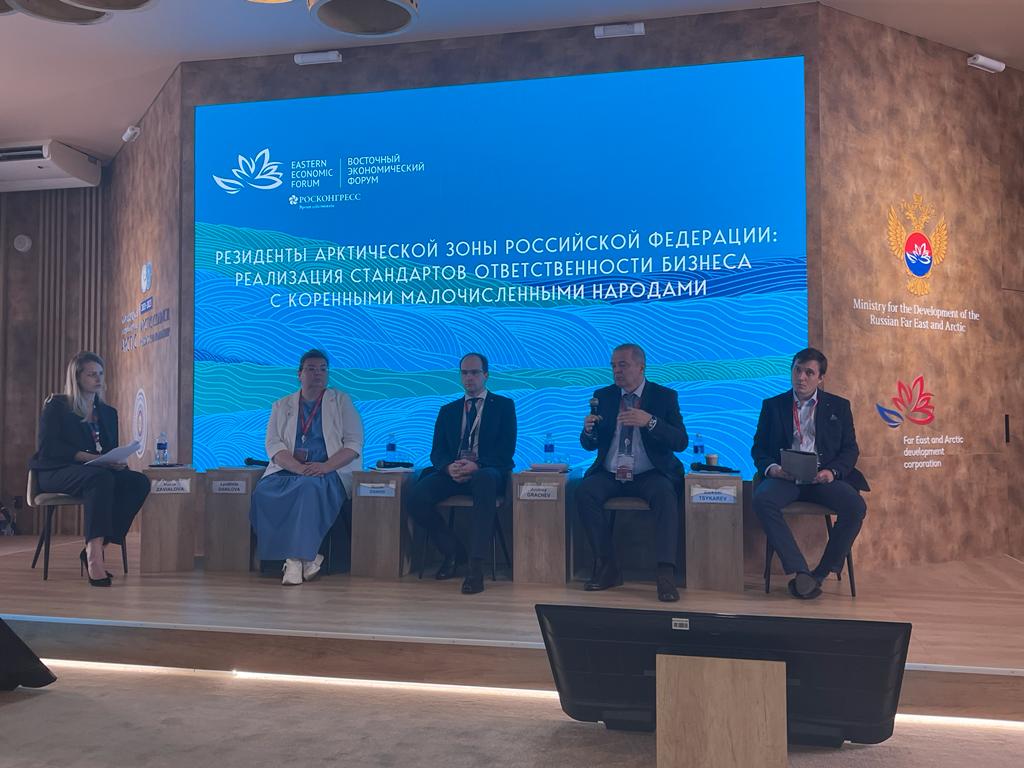Andrey Grachev, Vice President for Federal and Regional Programs of PJSC MMC Norilsk Nickel, spoke at a session of the Eastern Economic Forum dedicated to the topic “Residents of the Arctic zone of the Russian Federation: implementation of responsibility standards for business with indigenous minorities.”
The main topic of his presentation was the work that Norilsk Nickel does to support indigenous peoples. According to him, the company's efforts are primarily guided by the Russian Standards of Responsibility of Arctic Residents to Indigenous Minorities of the North that were developed in part thanks to Norilsk Nickel's vast experience in this field. “This document features the term "Free Prior Informed Consent" (FPIC) of representatives of indigenous minorities in the event that they move from places where industrial facilities are being built and in other similar situations. This is an attempt to create a fundamental document, a sort of a “bible” [for interaction with indigenous minorities] at the state level,” said Andrei Grachev. He advocated the adoption of an appropriate law regulating this area.

“Based on this, we adopted the Policy on Indigenous Peoples, which was the cornerstone, the ideology, that laid down the basic principles. The program was developed based on these principles. Its core principle regarding indigenous minorities was “nothing for us without us”: we surveyed the maximum number of communities, received a list of planned events from them, the vast majority of them were included in the program. In this sense, the program has become popular,” explained the vice-president of Norilsk Nickel. According to him, an agreement was signed between Norilsk Nickel and representatives of indigenous minorities - the Association of Indigenous Peoples of the North, Siberia and the Far East of the Russian Federation, its regional and Taimyr branches. The document provided for more than 40 measures with a total cost of 2 billion rubles for a period of 5 years. The plan is supervised and adjusted by the Coordination Council at the polar branch of Norilsk Nickel, in which more than 60 communities are represented. The indigenous minorities department was also created at the polar branch of the company which made it possible to work on a daily basis and increase the efficiency of the Coordination Council.
Among the implemented projects is the resettlement of indigenous minorities from the Tukhard village which was conducted in accordance with FPIC procedure, Grachev added. “Scientists gave their opinion and recommendations on the resettlement to a pollution-free area. Now a new village is being built there. An ethnological examination was carried out, which made it possible to find out the opinions of each resident.” Among other programs, the top manager of Norilsk Nickel mentioned giving out apartments to orphans of the indigenous minorities, building houses, recreation centers and fish and venison processing workshops.
“We also support large-scale projects in the cultural field. We implemented a project to restore the Nenets written language. Another interesting project is WW2 songs in national languages. Together with the Federal Agency for Nationality Affairs and MGIMO university, they created the School of Public Diplomacy. This project is aimed at training representatives of indigenous minorities to speak in various international organizations to protect their own interests and the interests of Russia. At the Polar State University we are implementing the “Students of Taimyr” program, which provides a quota of 20 slots for representatives of indigenous minorities who are fully supported by Norilsk Nickel and receive scholarships.”
Every company operating in Siberia, the North, and the Far East should have similar programs, Andrey Grachev believes. “This is nothing unusual. All you need is will, creativity and appropriate funding,” he added.
